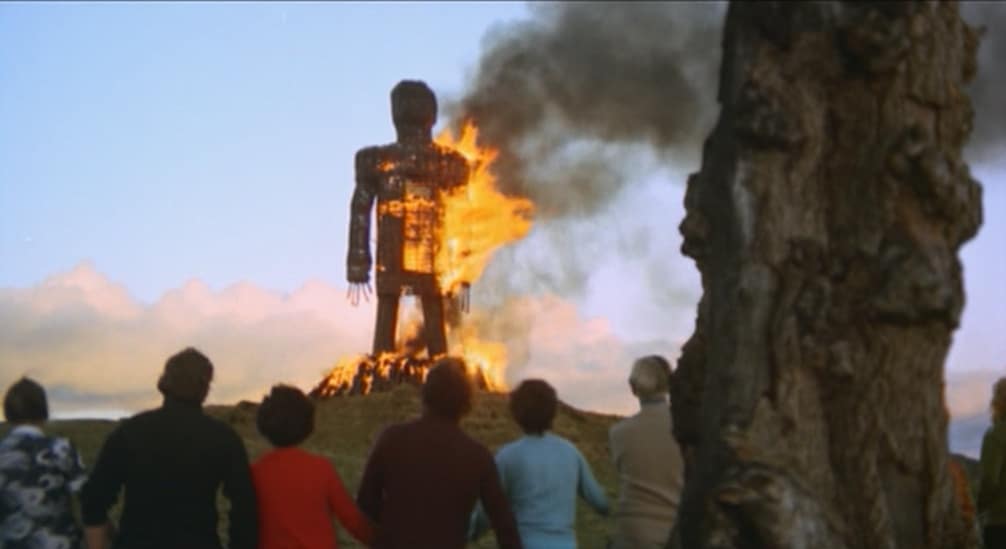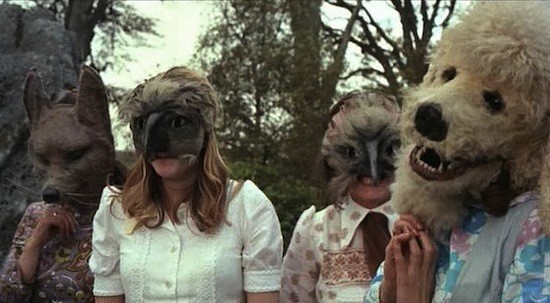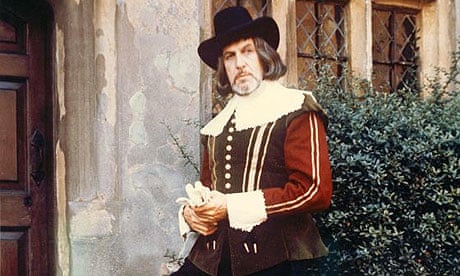 There is a bit of a vogue these days for 50th anniversary screenings of films, but it's never enough for them to just show the fucking film: they also force you to sit through the kind of bonus feature material that on a DVD you'd probably choose to ignore or maybe watch once some rainy afternoon while bored. So in this case an anniversary screening of The Wicker Man was preceded by a recording of a concert in which some musicians (all of whom were born after the film came out) played songs that appear in it, together with a series of interviews, including with Britt Ekland, two of director Robin Hardy's sons, a film critic, etc. It was in fact not uninteresting, with Britt Ekland in particular giving good celebrity bantz, but I don't think I would describe any of the bonus material as essential.
There is a bit of a vogue these days for 50th anniversary screenings of films, but it's never enough for them to just show the fucking film: they also force you to sit through the kind of bonus feature material that on a DVD you'd probably choose to ignore or maybe watch once some rainy afternoon while bored. So in this case an anniversary screening of The Wicker Man was preceded by a recording of a concert in which some musicians (all of whom were born after the film came out) played songs that appear in it, together with a series of interviews, including with Britt Ekland, two of director Robin Hardy's sons, a film critic, etc. It was in fact not uninteresting, with Britt Ekland in particular giving good celebrity bantz, but I don't think I would describe any of the bonus material as essential.
The film itself… well obviously it is amazing; it's not for nothing that I never turn down a chance to see it. And there's always an element of version bingo when you see The Wicker Man, with different versions varying in length and featuring unique scenes.
This I think was the final cut version, which giving Howie two nights on the island. This is good as it means we are treated to "Gently Johnny", probably the film's best song. But it also meant that there was a pointless mainland scene at the start, in which we see Howie doing some religious stuff in a church (especially pointless as the same scene appears in flashback later). It still left me pondering one of the great unanswered questions of The Wicker Man: to what Christian denomination does Howie belong? His in-your-face god bothering comes across as stereotypically Presbyterian, but the mainland church scene looks a bit high church. Could Howie be an Anglican or even (shudder) a Papist? I suspect the filmmakers were not being too careful in their representation of Scottish Christianity.
 One other thing struck me about the film, which maybe occurs to me every time I see it and is then forgotten afterwards: even in the two day version of the film, there is something a bit odd about the timescale. Think about what we are shown of Howie's actions. At the start of the film Howie lands on the island. After an initial conversation with the harbourmaster and a bunch of old lads, he goes and briefly interviews Rowan Morrison's mother about her daughter. And then it is dark, so he goes to the pub for his dinner and to bed down for the night. But it's summer in the Hebrides: it wouldn't be getting dark that early. What does Howie do between meeting Rowan's mother and going to the pub?
One other thing struck me about the film, which maybe occurs to me every time I see it and is then forgotten afterwards: even in the two day version of the film, there is something a bit odd about the timescale. Think about what we are shown of Howie's actions. At the start of the film Howie lands on the island. After an initial conversation with the harbourmaster and a bunch of old lads, he goes and briefly interviews Rowan Morrison's mother about her daughter. And then it is dark, so he goes to the pub for his dinner and to bed down for the night. But it's summer in the Hebrides: it wouldn't be getting dark that early. What does Howie do between meeting Rowan's mother and going to the pub?
images:
The Wicker Man (Warped Perspective: "The Willing Fool: the Spectacle of the Wicker Man by Robert J. E. Simpson")
Islanders (Movie Nation: "Classic Film Review: They should’ve known better than to try and Nic Cage a Classic — The Wicker Man (1973))


